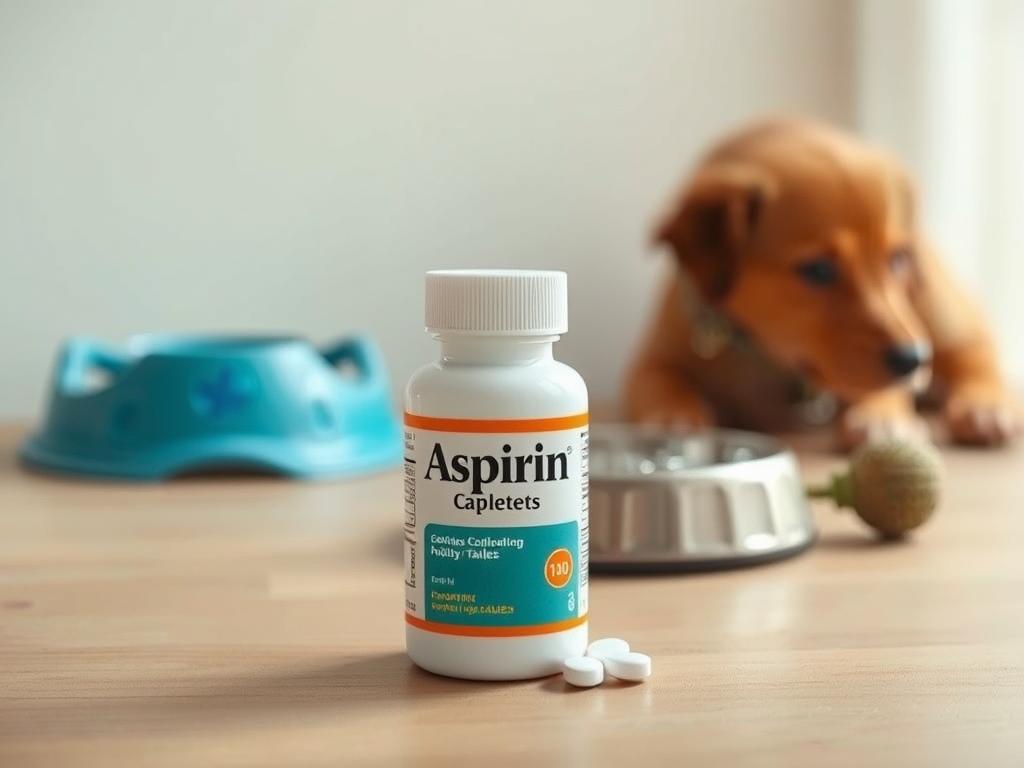Aspirin for Dogs: When and How to Use It Safely
Dog owners often wonder if they can give their dog aspirin to relieve pain. Aspirin, a common over-the-counter medication for humans, can be used in dogs under certain conditions. However, it’s crucial to understand the safety and potential risks associated with its use in canine care.
Aspirin for dogs can provide relief for pain and inflammation, but it must be administered carefully. The key to safe usage lies in understanding the appropriate dosage and potential interactions with other medications. Dog owners should consult with a veterinarian before giving their dog aspirin to ensure it’s used effectively and safely for dog pain relief.
Understanding Aspirin and Its Effects on Dogs
The use of aspirin in dogs is a topic of significant interest and debate among pet owners and veterinarians alike. Aspirin, a nonsteroidal anti-inflammatory drug (NSAID), is commonly used in humans to relieve pain, reduce inflammation, and lower fever.
What is Aspirin and How Does It Work?
Aspirin works by inhibiting the production of prostaglandins, which are substances in the body that cause pain, inflammation, and fever. In dogs, aspirin can be used to alleviate similar conditions, but its administration requires careful consideration due to differences in physiology between humans and dogs.
Differences Between Human and Canine Physiology
The metabolism and sensitivity to drugs can vary significantly between humans and dogs. Dogs have a different liver enzyme profile compared to humans, which affects how they metabolize aspirin. This difference is crucial when considering the dosage and potential toxicity of aspirin in dogs.
Types of Aspirin Products and Their Safety for Dogs
Not all aspirin products are created equal, and their safety for canine use varies. Some aspirin products contain additional ingredients that are toxic to dogs. Understanding the different types of aspirin and their ingredients is essential for dog owners.
| Aspirin Product Type | Safety for Dogs | Notes |
|---|---|---|
| Plain Aspirin (acetylsalicylic acid) | Potentially Safe | Under veterinary guidance, plain aspirin can be used. |
| Coated or Buffered Aspirin | Generally Not Recommended | Coatings or buffers may contain harmful ingredients. |
| Combination Products (e.g., with acetaminophen) | Dangerous | Other ingredients can be toxic to dogs. |
It’s essential for dog owners to consult with a veterinarian before administering any aspirin product to their pets. The veterinary guidance on aspirin is crucial to ensure safe and effective treatment.
Can I Give My Dog Aspirin? Veterinary Perspectives
Before giving your dog aspirin, it’s essential to understand the conditions under which it’s safe and the veterinary perspective on its use. Aspirin, or acetylsalicylic acid, is a medication used for its anti-inflammatory and pain-relieving properties in humans, but its use in dogs requires careful consideration.
Conditions Where Aspirin May Be Considered
Aspirin may be considered for dogs suffering from certain conditions, such as osteoarthritis or other inflammatory joint diseases. Veterinarians might recommend aspirin for its anti-inflammatory properties to help manage pain and improve mobility in affected dogs.
In some cases, aspirin is used under strict veterinary guidance for dogs with specific cardiovascular conditions. However, this should only be done under the close supervision of a veterinarian due to the potential risks involved.
When to Avoid Aspirin Completely
There are several situations where aspirin should be avoided entirely. Dogs with bleeding disorders or those prone to gastrointestinal ulcers should not be given aspirin due to its potential to exacerbate these conditions.
Pregnant or nursing dogs, as well as puppies, should not be given aspirin without veterinary consultation, as it can affect their health and development.
Aspirin is also contraindicated in dogs with certain medical conditions, such as kidney or liver disease, without consulting a veterinarian first. The risk of aspirin toxicity is higher in dogs with these conditions.
When to Consult Your Veterinarian First
It’s crucial to consult with a veterinarian before giving your dog aspirin. They can assess your dog’s overall health, consider any pre-existing conditions, and provide guidance on safe pain management options.
A veterinarian can help determine the appropriate dosage and monitor your dog for any adverse effects. They can also recommend alternative pain management strategies that may be safer or more effective for your dog’s specific condition.
Always follow veterinary advice when it comes to administering aspirin or any other medication to your dog. This ensures that you’re providing the best possible care while minimizing risks.
Safe Dosage and Administration Guidelines
The safe use of aspirin in dogs hinges on proper dosing and administration techniques. Aspirin can be an effective tool for managing pain and inflammation in dogs, but its administration requires careful consideration to avoid adverse effects.
Proper Dosing by Weight and Breed
Determining the correct aspirin dosage for dogs is primarily based on the dog’s weight. The typical recommended dose is between 10 to 20 mg/kg body weight, given every 12 hours. However, this can vary depending on the individual dog’s health status and breed.
- Small breeds (under 20 lbs): Consult a veterinarian before administering aspirin due to the higher risk of side effects.
- Medium breeds (20-50 lbs): The standard dose is often applicable, but monitoring is crucial.
- Large breeds (over 50 lbs): Higher doses may be required, but always start with the lower end of the dose range.
It’s essential to consult with a veterinarian to determine the most appropriate dose for your dog, as they can provide guidance based on the dog’s specific health needs and medical history.
Administration Methods and Timing
Aspirin can be administered orally, typically with food to reduce gastrointestinal upset. The timing of administration is crucial; giving aspirin with meals can help mitigate some of the common side effects.
- Administer aspirin with food or after a meal.
- Use a pill splitter or crusher to ensure accurate dosing, especially for smaller dogs.
- Monitor your dog closely after administration for any signs of adverse reactions.
Duration of Treatment and Monitoring
The duration of aspirin treatment should be as short as possible to minimize the risk of side effects. Regular monitoring by a veterinarian is essential to adjust the dosage or discontinue use if necessary.
Regular check-ups with your veterinarian will help ensure that the aspirin is effective and that your dog is not experiencing any adverse effects. This includes monitoring for signs of gastrointestinal upset, changes in behavior, or other concerning symptoms.
By following these guidelines and consulting with a veterinarian, dog owners can safely use aspirin to provide relief for their pets.
Potential Side Effects and Risks
While aspirin can be beneficial for dogs under certain conditions, it’s crucial to understand the potential risks involved. Aspirin, like any medication, can have side effects, some of which can be serious.
Common Side Effects to Watch For
When giving aspirin to dogs, it’s essential to monitor them for common side effects. These can include gastrointestinal upset, such as vomiting or diarrhea. Some dogs may also exhibit signs of lethargy or loss of appetite. If you notice any of these symptoms, it’s crucial to consult with your veterinarian.
Signs of Aspirin Toxicity and Overdose
Aspirin toxicity is a serious risk when administering this medication to dogs. Signs of toxicity can include severe vomiting, diarrhea, abdominal pain, and in severe cases, seizures or coma. If you suspect your dog has ingested too much aspirin, it’s vital to seek veterinary care immediately. For more detailed information on aspirin toxicity, you can visit AKC’s expert advice on aspirin for.
Interactions with Other Medications
Aspirin can interact with other medications your dog is taking, potentially leading to adverse effects. For instance, combining aspirin with other nonsteroidal anti-inflammatory drugs (NSAIDs) or corticosteroids can increase the risk of gastrointestinal complications. Always inform your veterinarian about any other medications your dog is taking.
Emergency Steps if Problems Occur
If you notice any signs of aspirin toxicity or severe side effects, act quickly. First, contact your veterinarian or an emergency veterinary clinic. Provide as much information as possible about the aspirin dosage and the symptoms you’re observing. In some cases, inducing vomiting may be recommended, but this should only be done under veterinary guidance.
Being aware of the potential side effects and risks associated with aspirin use in dogs is crucial for responsible pet ownership. Always consult with a veterinarian before administering aspirin, and monitor your dog closely for any adverse reactions.
Conclusion: Veterinary-Approved Alternatives for Pain Management
Dog owners seeking to manage their pet’s pain effectively should consider veterinary-approved alternatives to aspirin. For canine pain management, options like Mokai Joint Restore offer a natural supplement designed to support dog joint health, ease stiffness, and improve mobility. This product combines ingredients such as glucosamine, chondroitin, and omega-3 rich krill oil to promote healthy joints.
Under veterinary guidance on aspirin, dog owners can explore alternative pain relief for dogs that may be safer and more effective in the long run. Consulting with a veterinarian is crucial to determine the best approach for managing a dog’s pain, as they can recommend the most suitable treatment based on the dog’s specific needs and health status.
By choosing veterinary-approved alternatives, dog owners can ensure their pets receive the most appropriate care for their condition, improving their quality of life.






